By Jim Davis - Florida Catholic
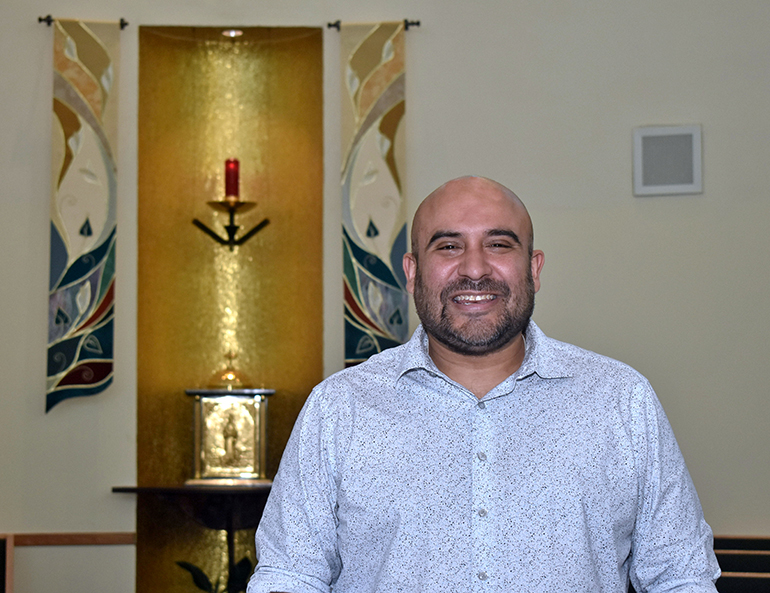
Photographer: James Dwight Davis
Richard Carrillo pauses in front of the altar in the chapel of St. John Neumann Church, Miami, where he directs the choir. He’ll present the "Mass of the Americas" Oct. 3, 2023, at Epiphany Church, also in Miami.
MIAMI | Many people post selfies from glamorous vacation spots. Richard Carrillo’s selfies were with yellowed, centuries-old sheet music.
The texts, at archives in Mexico City, touched him at two of his deepest levels. Going back to the 16th and 17th centuries, they're the first-known compositions in the language of his Aztec ancestors — and they're Catholic songs and prayers.
“Those are my roots. This is where it all started,” Carrillo said gleefully at St. John Neumann Church, where he directs the choir.
He's doing more than posting pictures; he's organizing a Mass that blends Aztec and European heritages. The “Mass of the Americas,” by Los Angeles composer Frank La Rocca, will have its Miami premiere at 7 p.m. Oct. 3 at Epiphany Church.
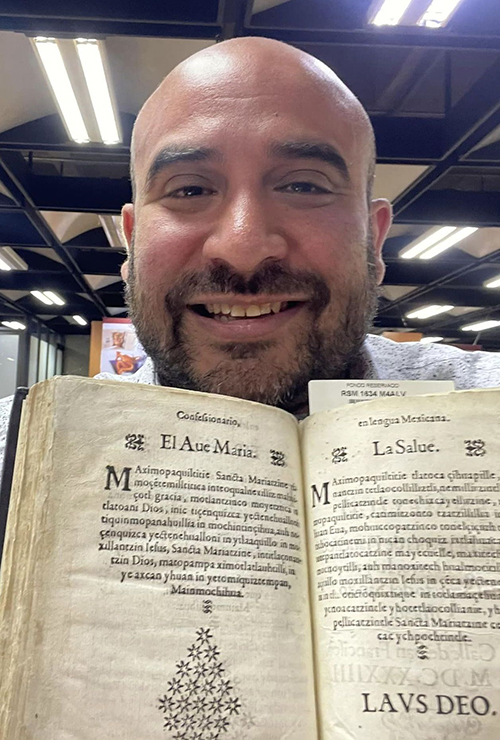
Photographer: Courtesy
Richard Carrillo shows a centuries-old text for the Ave Maria in Nahuatl, the language of his Aztec ancestors, which he saw this summer on a research trip to Mexico City. Nahuatl will be one of the languages of the "Mass of the Americas," which Carrillo will present Oct. 3, 2023, at Epiphany Church in Miami.
Carrillo plans to gather a 15-piece orchestra with 150 singers from St. Thomas University, the University of Miami and parishes around the archdiocese. But it will be a real worship service, with Father José Alvarez, pastor at Epiphany, as the celebrant.
That’s important to Carrillo, who will produce the Mass as part of a doctoral thesis for the University of Miami.
“To me, it’s about blending a faith experience with a music experience,” he said. “If music helps me express my joy in the Eucharist, why not share it?”
The “Mass of the Americas” earns its name well. It’s a double tribute to Mary: both as Our Lady of the Immaculate Conception, patroness of the United States, and as Our Lady of Guadalupe, patroness of Mexico and all the Americas.
First performed in 2018, the Mass blends classical music with traditional Mexican music — plus lyrics in Latin with some in Nahuatl, the indigenous language of the Aztecs.
MUSIC OF TWO WORLDS
An album version debuted in 2022 at Number 1 on the “Billboard” classical chart. The Mass has been part of an actual liturgy in New York, Chicago, San Francisco, Houston, Rome, Washington, D.C. and elsewhere. The Mass has also been broadcast over the EWTN network.
Carrillo said the success is partly in the interweaving of Old and New World musical elements.
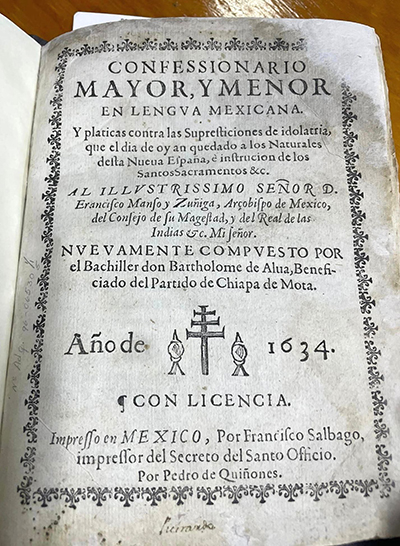
Photographer: Courtesy
Here's a 17th century text examined by Richard Carrillo this summer in Mexico City. The trip was part of Carrillo’s research for the "Mass of the Americas," which he’ll present Oct. 3, 2023, at Epiphany Church in Miami.
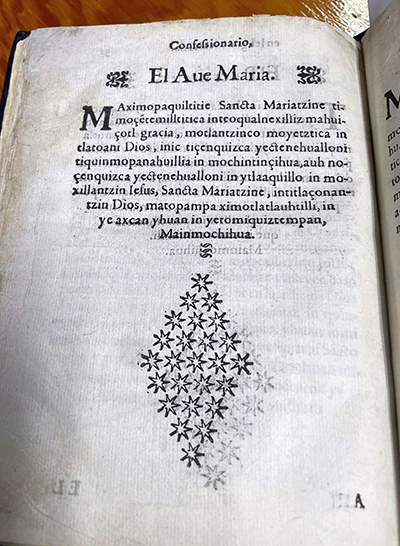
Photographer: Courtesy
Here's the opening page of a text for Ave Maria in Nahuatl, the language of his Aztec ancestors, which Richard Carrillo saw this summer on a research trip to Mexico City. Nahuatl is one of the languages in the "Mass of the Americas," which Carrillo will present Oct. 3, 2023, at Epiphany Church in Miami.
“Aue Maria,” an Ave Maria in Nahuatl, includes organ, violin and Aztec marimba. One section of the Mass includes subtle chords of “La Guadalupana,” a Mexican folk song about Mary. Another has orchestral tinges of “Las Mañanitas,” sung for weddings, birthdays and other celebrations.
“It’s not a traditional Mass with some ethnic music,” Carrillo said. “If you know the (folk) melody, you’ll recognize it. If you don’t, you’ll just think it’s classical music.”
He noted that classical composers have often done the same over the centuries. Brahms, Mozart and Schubert incorporated folk melodies in their compositions. Antonin Dvorak and Aaron Copland did much the same in 20th century America.
If La Rocca’s piece is the right Mass for the times, Carrillo is the right man to conduct it. A cradle Catholic who grew up in San Antonio, he was born to an Aztec father and a Mexican mother of Spanish descent.
Carrillo attended the University of Houston, serving at the Neumann Center there and singing at the city’s Cathedral of the Sacred Heart. He then worked for three years with the St. Paul-based NET Ministries, leading a chorale in musical evangelization at parishes in several states.
He also spent seven years as campus minister and choir director at Providence Academy in Minneapolis; then he earned a master’s degree in choral conducting at Missouri State University.
In 2021, he began studies with the Frost School of Music at the University of Miami, where he's now in his last year as a doctoral candidate in choral conducting. He first heard the “Mass of the Americas” last fall.
“I immediately fell in love,” he said. “It’s just beautiful music. There’s religious symbolism throughout. And the ‘Guadalupana’ took me back to my childhood. All of those things were happening together.”
‘PERFECT AUDIENCE’
When Carrillo e-mailed La Rocca about his plans to produce the Mass in Miami, La Rocca was delighted. Carrillo himself embodies the fusion of faith, music and ethnic heritage in his Mass, in La Rocca’s view.
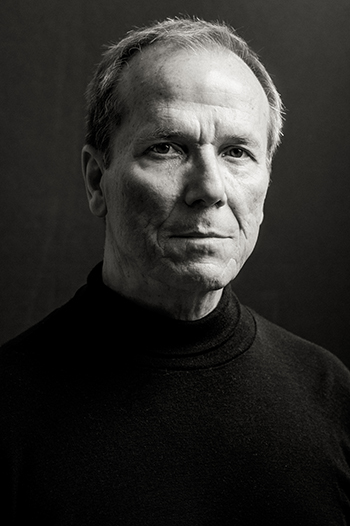
Photographer: Courtesy
Composer Frank La Rocca blended Old and New World languages and musical themes in his "Mass of the Americas," which will be presented Oct. 3, 2023, at Epiphany Church in Miami.
“Richard was, in some ways, the perfect audience for this piece,” he said. He added that it was a “great honor” to have the composition connected with the Frost School.
“It legitimizes the work beyond its primary religious purpose — it legitimizes it as art,” La Rocca said. “The Frost School of Music choral program is in the very top tier of the United States.”
Although the University of Miami is a secular school, Carrillo said he's felt “nothing but support” for his thesis. He said his supervisor is “all about students finding their passion, backed by scholarly research.”
That scholarship took him to Mexico City this summer. At the National Library there, he examined the documents La Rocca used for his Mass.
One text was the Valdez Codex from 1599, believed to be the first polyphonic sheet music in Nahuatl. Another was a version of Ave Maria, written by a priest in 1634 — the first known translation of traditional prayers into the Aztec tongue.
Carrillo even looked up an expert in Mexico, learning the history and pronunciation of Nahuatl in order to conduct the “Mass of the Americas.”
He said he hopes the more modern, diverse treatment of worship in “Mass of the Americas” will draw younger people. He noted that many people have given up the search for two of the three classical “transcendental” values — truth, goodness and beauty —meant to draw them to the divine.
“They believe truth is relative, and people don't know what goodness is anymore,” Carrillo said sadly. “Beauty is the only one that most people still recognize. I want to bring the beauty of music to draw people closer to God, and closer to the Mass.”
For now, his main challenge in presenting the “Mass of the Americas” is monetary. He hasn't raised all of the $35,000 that he said will be needed to pay instrumentalists and some singers, plus buying sheet music and the right to livestream the event.
Those who wish to donate should visit https://gofund.me/7ea6ae44.
IF YOU GO
- Event: “Mass of the Americas.”
- What's happening: Mass blending folk and classical music, also incorporating Aztec music and language.
- When: 7 p.m. Tuesday, Oct. 3.
- Where: Epiphany Church, 8235 S.W. 57 Ave., Miami
- Admission: Free.
- Information: Contact Richard Carrillo at [email protected].
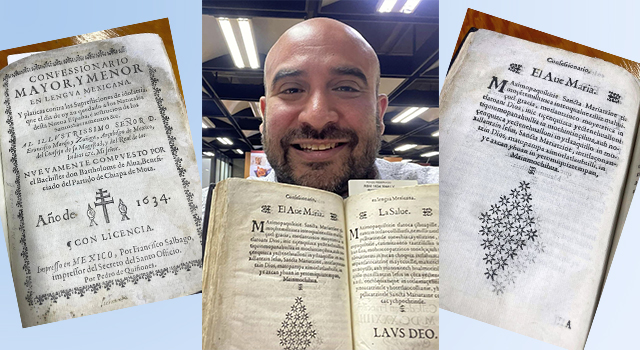

Comments from readers